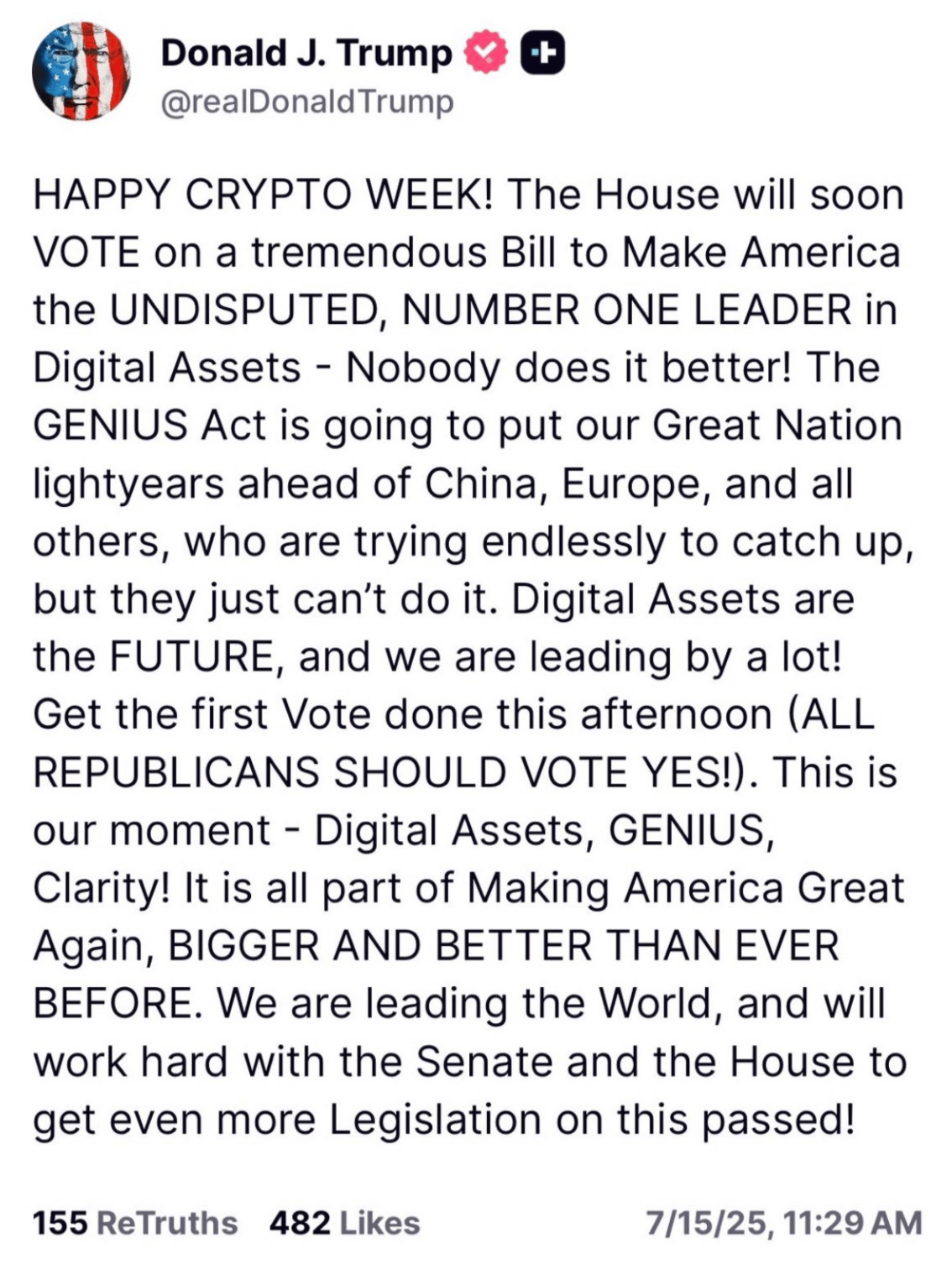- Forward Guidance
- Posts
- 👀 Crypto Week watch
👀 Crypto Week watch
Milestone legislation in the homestretch?

So-called Crypto Week continues, and we’re all here to witness it. Casey reminds us what bills are on the table and where lawmakers stand on them.
Ben gets into how Kraken’s latest US derivatives launch reflects a broader industry trend. Here we go:
‘Crypto Week’ continues
It’s day two of “Crypto Week” in the US House.
The Rules Committee on Monday afternoon heard from fellow representatives on three crypto bills: the GENIUS Act, the CLARITY Act and the Anti-CBDC Surveillance Act.
The hearing went late into the evening — with debate surrounding the more controversial aspects of the GENIUS Act lasting hours.
Here’s what you need to know about each potential law and what proponents and critics have to say:
GENIUS Act
This is the stablecoin-focused bill that passed the Senate last month with bipartisan support. It’s poised to pass in the House, too, but not everyone is happy about it.

Most Democrats that oppose the bill argue it fails to stop President Trump and his family from profiting off of USD1, the stablecoin tied to World Liberty Financial.
When asked during Monday night’s Rules Committee hearing why he wouldn’t support an amendment that explicitly bars the president from issuing a stablecoin, Rep. French Hill said Trump is not the issuer of a stablecoin — but an owner of a company that issued one.
When pressed further, Hill said the Senate had already discussed this issue at length (and 68 Senators still voted to pass the bill).
Some Dems also think that while the bill might be a step in the right direction, it falls short. The legislation is too weak on anti-money laundering and terrorism financing protections, opponents insist.
US-based stablecoin issuers have largely gotten behind the legislation. Circle — fresh off its public market debut — has even applied to establish a national trust bank in order to align with the policy.
For foreign issuers like Tether, the GENIUS Act comes with more hoops to jump through. The bill mandates that stablecoins be backed by cash and cash equivalents and that issuers file regular audited financial statements, something Tether has yet to do (despite quarterly attestation reports).
CLARITY Act
This bill does two main things: First, it establishes the concept of (and defines) “digital asset commodities.” Second, it divides regulatory authority between the SEC and the CFTC.
The CLARITY Act is a bit more controversial within the industry. It’s by far the longest bill of the three, so it gives interested parties more to fight over.
One of the main issues those against the bill have relate to decentralization. Sufficiently decentralized blockchains — defined in the legislation as transparent chains with no person or individual in control — are considered commodities.
The Rules Committee on Monday allowed the bill to advance, but representatives will have some amendments to consider.
Anti-CBDC Surveillance Act
This one is straightforward. It seeks to amend the Federal Reserve Act to prohibit the central bank from issuing a retail central bank digital currency.
Proponents like the privacy aspects of the bill, arguing that a CBDC could give the government too much access to sensitive information.
Those against it say ruling out ever establishing a CBDC could put the US behind other countries exploring the technology. Democrat Rep. Stephen Lynch said the bill is “an act of breathless stupidity.”
A procedural vote to determine debate details for the three bills was set to happen around the time this newsletter goes out. We’ll keep an eye on this, so check Blockworks.co for updates.
— Casey Wagner
Check out the Digital Asset Summit early speaker lineup. Join attendees from BlackRock, Citi, Credit Suisse, Bank of England, Jane Street and more.
Secure your early bird ticket today with promo code: FGNL
📅 October 13-15 | London

The cash that political action committees Fairshake, Defend American Jobs and Protect Progress currently have on hand, they revealed Tuesday. Coinbase made a recent contribution of $25 million.
That money will be spent on the PACs’ mission of “building lasting support for crypto and blockchain innovation.” That has, in the past, meant efforts to get pro-crypto lawmakers elected.

Kraken’s latest US offering reflects a theme we’ve seen again and again this year: building out a one-stop shop and/or multi-asset trading platform and/or unified investing experience. I’ll let you pick the buzzy marketing language.
The crypto exchange in May closed on its acquisition of NinjaTrader — a company with a CFTC-registered FCM license that allows Kraken to offer crypto derivatives in the US.
A couple months later, here we are: CME-listed crypto futures available via Kraken Pro. The company plans to offer commodity, fixed income, FX and equity futures later this year.
Crypto giants realize the value of the derivatives market. It’s a higher-margin business segment (i.e. compared to spot trading) that they’ll look to expand as trading fees are compressed, Architect Partners’ Michael Klena previously told me.
I’m sure you recall Coinbase revealing its intent to buy Deribit for $2.9 billion. Unlike Kraken’s buy, that acquisition was more about extending its derivatives footprint outside the US.
But the broader goal for these industry behemoths is the same. Offer traders “seamless access” (I’ve read one too many press releases) to as many exposures as possible (spot, options, futures, etc.).
That’s now extended further to include tokenized stocks and ETFs — though the current iteration of certain offerings (Kraken’s xStocks and Robinhood’s stock tokens) means owning tokens that follow the underlying’s price — not the actual stock or ETF.
Dinari chief business officer Anna Wroblewska envisions the “cross-asset opportunities” if NYSE-, CBOE- and CME-linked assets, for example, unified (there’s that word again) in one place that all market participants could access.
Dare to dream — particularly as movement on the crypto legislation front could mean the industry is closer to such a reality.
— Ben Strack
